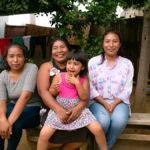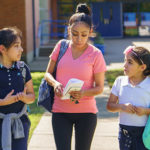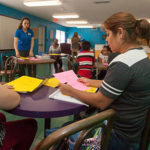WACO—It wasn’t the worst story Viviana Triana had heard in her role as bilingual counselor at the Advocacy Center for Crime Victims & Children.
The center provides free short-term counseling to primary and secondary victims of crime in Waco, which among other issues includes sexual or physical abuse, robbery, homicide or suicide. So, Triana had heard terrible stories before. But this one was different.
|
Viviana Triana serves as bilingual counselor at the Advocacy Center for Crime Victims & Children in Waco. (BAYLOR PHOTOGRAPHY)
|
A woman and her two young children had come to the center one Friday seeking help to deal with the domestic violence the husband inflicted on them. Encouraged, the woman planned to return the following Monday to begin counseling with Triana.
When the woman missed her appointment, the case manager followed up. The news was not good. Her abusive husband had beaten her severely over the weekend, in front of their children. She remained in a coma for two weeks before losing her final battle.
With the husband incarcerated, the victim’s sister was given custody of the children, and she, the sister’s mother and the two children began coming to Triana for the treatment their loved one didn’t get a chance to receive.
“The sister just sobbed and sobbed at the first session,” Triana said. “She couldn’t speak, and I just sat there with her and let her cry. We support them in their grieving.”
Not many people can sit as witnesses to unspeakable pain, but Triana, who earned her Master of Social Work/Master of Divinity degrees in 2008 from Baylor University’s School of Social Work and Truett Theological Seminary, believes that for her it is both gift and calling.
“When a person first comes, you see the pain the suffering, and you wonder how this person can make it; she has experienced too much,” she said. “And then you start working with them, it is so amazing to see them begin to heal.”
Oftentimes, the victim is deeply shamed—not only at her circumstances, but also at revealing such raw emotion, Triana said. “I tell them: ‘It is a gift to be a part of your healing process. It is a privilege you are giving me.’”
Sign up for our weekly edition and get all our headlines in your inbox on Thursdays
This quietly confident young woman sitting in her softly lit office exudes a sense of calm and assurance. Her presence is like balm for a victim ravaged both physically and emotionally.
“Sometimes they have been keeping the secret for so many years,” she said. “Here they will find someone who will listen, who will not judge, who will validate what they’ve been through.”
A native Colombian, Triana came to the United States in 2000 to attend Baptist University of the Americas in San Antonio. She came to Waco in 2004 to begin her dual degree at Baylor while her future husband, Carlos Charco, finished his degree at Dallas Baptist University. They married in 2005, and both were active in helping establish the first Board of Immigra-tion Appeals-recognized immigration service center in Waco, called the Ruth Project.
She interned at the advocacy center in fall 2007 and began work as a counselor there a week after her May 2008 commencement. Although she always believed she would be involved in clinical work, it took her first client at the center to remind her of the call on her life.
When she was a 13-year-old girl in Colombia, one night she had a dream. In it, she was sitting in an office and many people were lined up outside her office waiting to see her. These people were in great emotional pain. They were screaming and yelling and overwhelmed, she recalls.
“One by one, I placed my hand over their hearts,” she says, “and then their whole demeanor would change. They were no longer in pain; they left my office laughing.”
The wonder of that revelation still shines in Triana’s eyes as she shares her story. She says that, at 13, she thought her gift was one of healing through prayer. And admits she mostly had forgotten the dream—until she met with her first client at the advocacy center.
“She was a child, the victim of sexual assault by her stepfather. I met with her mother first, and she was crying and screaming, very passionate. She couldn’t believe this was happening. That’s when the dream came back to me.”
Now, she sees from 20 to 30 clients a week and leads a support group for Spanish-speaking clients. She has learned it is better if she does not go straight home after work; instead, she exercises at a gym or buys groceries. She values the support of her colleagues at the center to help her debrief and cope with atrocities she hears. She has learned how to set emotional boundaries for self-care without desensitizing herself to someone else’s pain.
“When things get tough, I have to go back to that dream,” she said. “I go to God and say: ‘I know you have called me to this. Give me the strength, because this is hard.’”
And then there are the glimmers of hope—such as the family whose mother was murdered. After working with them for a couple of months, Triana sensed they wanted to give back in some way but didn’t know how. Triana began a Wednesday night support group with the idea that women who had come further along the path of healing could help women whose pain was much newer, and she invited this family to attend.
“The first session was very difficult. But as they began to get stronger, they reached out to others,” she says. “One will say, ‘This is what helped me get through that stage …’ or ‘Don’t worry, it is going to get better.’
“That they can do that for one another in the midst of their own pain. I find that amazing.”
The victim’s two small children still come for counseling with Triana, but these days, they tell her, “We have two moms—the one in heaven and the one waiting for us outside.”
Two wounded hearts that Triana has touched have begun to heal. “When you see the little bit of hope return, then you know you have made a difference.”














We seek to connect God’s story and God’s people around the world. To learn more about God’s story, click here.
Send comments and feedback to Eric Black, our editor. For comments to be published, please specify “letter to the editor.” Maximum length for publication is 300 words.